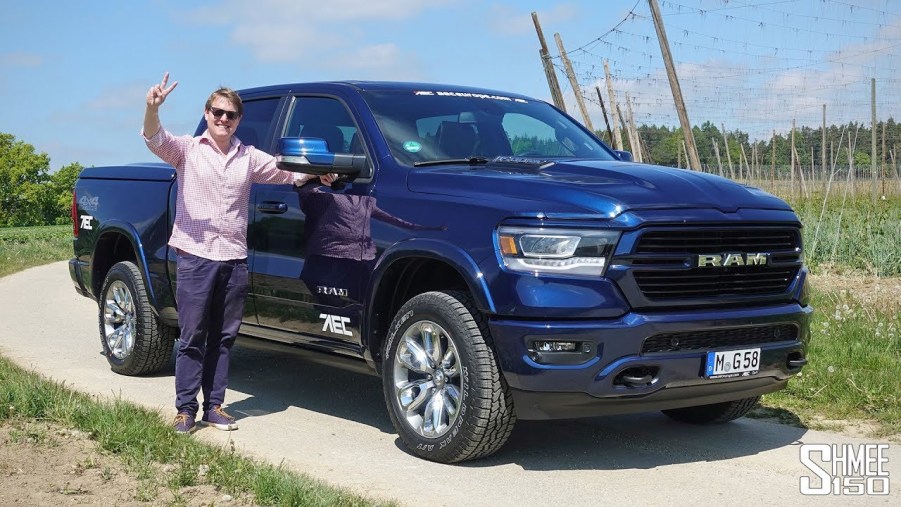
Why You Don’t Owe Any Truck Brand Loyalty
The stereotype of many pickup truck buyers is extreme loyalty to their truck of choice. Chevy Silverado people wouldn’t think of owning a Ford F-150, that kind of thing. The crowds of Calvin stickers on rear windows certainly doesn’t help dissuade the concept. Neither do the sales figures of a truck like the Honda Ridgeline, liked by critics but seemingly too different from other pickups for consumers. However, the reality of the situation is a bit different. In recent surveys run by CarGurus.com and CarMax, results show truck brand loyalty isn’t as rock-solid as some may think. But even if it were, it may be time to rethink the concept of truck brand loyalty.
What factors impact truck brand loyalty

Both The Drive and CNET reported on the CarGurus.com survey. The site surveyed 450 owners split between various brands: the Detroit Three, as well as Toyota, GMC, and Nissan. The surveyed pickup owners were asked what, if anything, would make them switch to a different brand of truck.
Price tops the list. 42% of them said a price bump of $5000 or more would make them swap loyalties; an additional 20% were swayed by a $10,000 increase. In fact, MSN Autos reported that CarGurus.com found 67% of truck buyers think trucks are actually too expensive. Of the survey participants over age 45, 80% agreed with that statement.

The second-most-common switch motivation? Engine size/power and fuel efficiency. Considering the kinds of jobs pickups perform—not to mention the psychological reasons people buy them—this makes a certain amount of sense. Trucks that can’t haul, or trucks that burn too much, aren’t much use. Although, another important truck attribute, bed size, was only fourth on the list of switch factors. Safety was third. And only 29% said they wouldn’t switch brands for any reason.
Truck brand loyalty vs brand loyalty overall
However, to be loyal to a specific truck is one thing. To be loyal to the brand as a whole is another. And other aspects of the CarGurus survey, as well as a separate survey run by CarMax, show this difference.

MSN Autos reports that 17% of the polled owners wouldn’t buy another truck, due to fuel and maintenance costs. And of the owners that had already gotten rid of their truck, 35% switched to a sedan, and 37% went to a crossover or SUV. Trucks may be able to haul a lot of stuff, but not every person needs that level of utility day-to-day. That may be why Hyundai is positioning the upcoming Santa Cruz slightly different compared to other pickups.

CarMax found something similar in their brand loyalty survey. While 22.1% of Ram 1500 owners repeat-buy their trucks (Autoblog found Ram enjoys the highest truck-brand loyalty and fourth-highest overall brand loyalty), but trucks fell far behind SUVs in terms of vehicle-type loyalty. 61% of SUV/crossover owners bought another SUV or crossover. Meanwhile, only 31% of crew-cab truck owners bought another truck like that. Sedans were in-between, at 47.5%.
It’s clear, then, that not every truck owner necessarily wants a new version of their truck—or even another truck, period. And they have very sound, rational reasons for thinking like this. And all of this is a good thing.
Why blind loyalty to a brand isn’t a smart idea for you or the brand
People get excited about the trucks and cars they buy. And if they really like it, they recommend it to their friends and family. There’s nothing wrong with this. But consumers need to keep an open and critical mind about it.

Being constantly loyal to a brand, regardless of what the company puts out, doesn’t help the brand. This doesn’t just apply to trucks or cars, but to things like computers and smartphones. As both ComputerWorld and Lifehacker have pointed out, blind brand loyalty locks you, the paying consumer, out from the benefits of an open market. The whole reason all these brands are competing with each other, and constantly trying to improve and innovate, is to please you and bring in your business. Automatically assuming whatever Ram or Ford or Chevrolet comes out with will be “the best truck EVAR” helps no one. It makes the company feel like they don’t have to try and keep up with the rest of the market because there will always be a buyer. And that’s part of the reason why the Detroit automakers were in so much trouble during the Great Recession.
Companies should always strive for improvement. And blind loyalty removes the motivation for it. And actually, it’s not us that need to be loyal. Courteous, yes, but not loyal.
Manufacturers need to be loyal to us
Not everything a truck manufacturer puts out will be a success. Even features like GMC’s Quadrasteer, which noticeably improved truck handling, don’t always prove popular enough to last long. At the same time, sometimes popular features can turn brand loyalists off. Ram’s new multi-function tailgate, for instance, has been dismissed by some Ram fans as a “gimmick.” But as a consumer who is spending real money on something, it’s you who has the power.

As SlashGear has explained, retaining loyal customers is what makes companies work so hard to make new products and one-up their competitors. If you like a pickup, you’ll put money towards it. But you are under no obligation to do so. Even if you’ve been a Silverado fanboy for life, if you don’t like the newest model, you don’t have to buy it. Auto companies measure satisfaction through revenue. They are providing a product and service to us, not the other way around. We, as consumers, should not and cannot think we serve them. If a manufacturer burns you because your truck keeps breaking, walk away.
You don’t need to be loyal to a brand of truck. If the truck brand wants to stay in business, it needs to be loyal to you.


